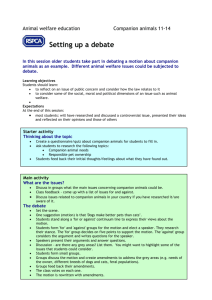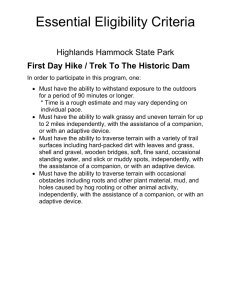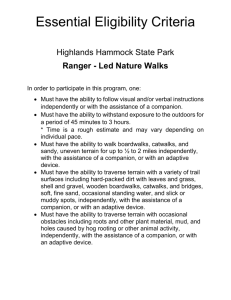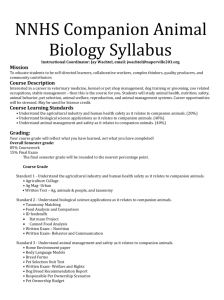Document 11908073
advertisement
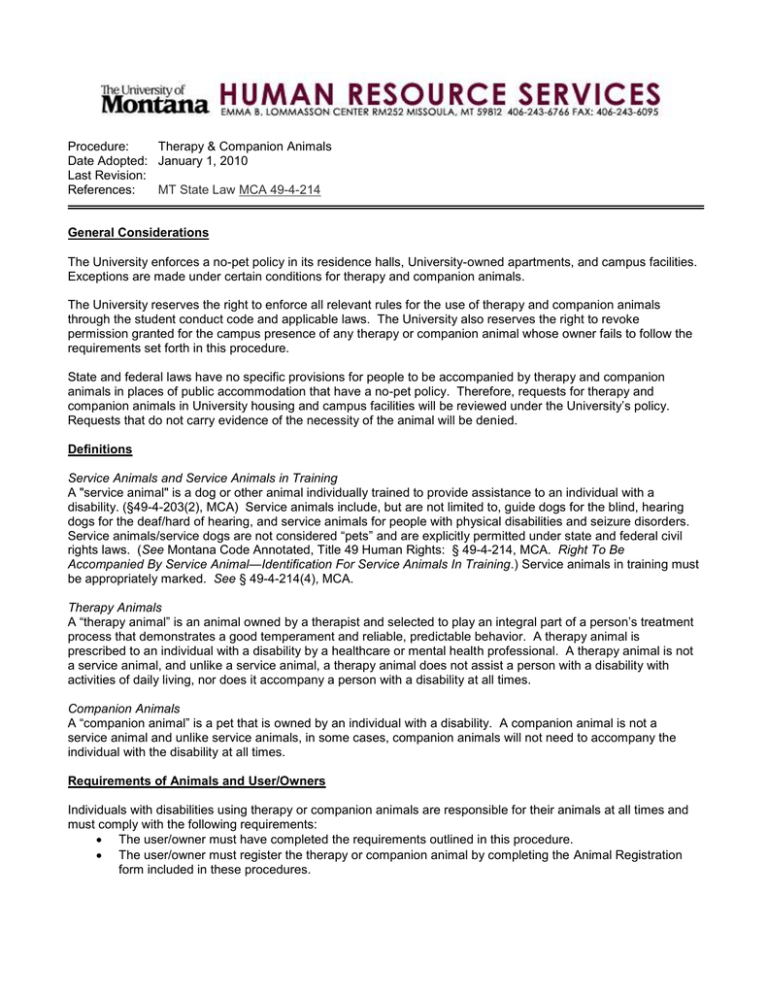
Procedure: Therapy & Companion Animals Date Adopted: January 1, 2010 Last Revision: References: MT State Law MCA 49-4-214 General Considerations The University enforces a no-pet policy in its residence halls, University-owned apartments, and campus facilities. Exceptions are made under certain conditions for therapy and companion animals. The University reserves the right to enforce all relevant rules for the use of therapy and companion animals through the student conduct code and applicable laws. The University also reserves the right to revoke permission granted for the campus presence of any therapy or companion animal whose owner fails to follow the requirements set forth in this procedure. State and federal laws have no specific provisions for people to be accompanied by therapy and companion animals in places of public accommodation that have a no-pet policy. Therefore, requests for therapy and companion animals in University housing and campus facilities will be reviewed under the University’s policy. Requests that do not carry evidence of the necessity of the animal will be denied. Definitions Service Animals and Service Animals in Training A "service animal" is a dog or other animal individually trained to provide assistance to an individual with a disability. (§49-4-203(2), MCA) Service animals include, but are not limited to, guide dogs for the blind, hearing dogs for the deaf/hard of hearing, and service animals for people with physical disabilities and seizure disorders. Service animals/service dogs are not considered “pets” and are explicitly permitted under state and federal civil rights laws. (See Montana Code Annotated, Title 49 Human Rights: § 49-4-214, MCA. Right To Be Accompanied By Service Animal—Identification For Service Animals In Training.) Service animals in training must be appropriately marked. See § 49-4-214(4), MCA. Therapy Animals A “therapy animal” is an animal owned by a therapist and selected to play an integral part of a person’s treatment process that demonstrates a good temperament and reliable, predictable behavior. A therapy animal is prescribed to an individual with a disability by a healthcare or mental health professional. A therapy animal is not a service animal, and unlike a service animal, a therapy animal does not assist a person with a disability with activities of daily living, nor does it accompany a person with a disability at all times. Companion Animals A “companion animal” is a pet that is owned by an individual with a disability. A companion animal is not a service animal and unlike service animals, in some cases, companion animals will not need to accompany the individual with the disability at all times. Requirements of Animals and User/Owners Individuals with disabilities using therapy or companion animals are responsible for their animals at all times and must comply with the following requirements: The user/owner must have completed the requirements outlined in this procedure. The user/owner must register the therapy or companion animal by completing the Animal Registration form included in these procedures. The user/owner must acknowledge and sign the User/Owner Statement for Therapy and Companion Animals included in these procedures. The animal must wear a leash, collar, cape, harness, backpack or other appropriate visible identification that identifies in writing that the animal is a therapy or companion animal. The user/owner of the animal must be in full control of the animal at all times. The user/owner must ensure that animals are on a leash at all times. The user/owner must take responsibility for the behavior of the animal in private and public places, and for due care and diligence in the use of the animal on campus. The animal must be accompanied by the user/owner at all times while in University facilities. The user/owner is responsible for any property damage caused by the animal. The user/owner must clean up after the animal, including the sanitary disposal of animal wastes. Use of the animal shall not constitute a direct threat to the health and safety of others. The user/owner must ensure that dogs are licensed in accordance with Missoula City and County regulations and wear a valid vaccination tag. The user/owner is responsible for the health of the animal and must provide verification from a qualified veterinarian that all vaccinations appropriate for that type of animal are current. The user/owner of a companion and/or therapy animal must carry and be able to produce the UM owner identification card while in any University of Montana facility. If an owner/user obtains a new/different therapy or companion animal to be used under the provisions of this procedure the new/different therapy or companion animal must be registered and approved. A new UM owner identification card will be created. Approval Process Students Disability Services for Students (DS) serves as the campus authority for the approval for students or their family members requesting a therapy or companion animal in any UM facility. Students planning to bring a therapy or companion animal to any UM housing facility must notify the Residence Life Office, and comply with this procedure. DS will gather and assess evidence as necessary from the diagnostician/therapist that the therapy or companion animal is necessary as a reasonable program modification. Requests that lack evidence of the animal’s necessity to the student will be denied by DS. Employees Human Resource Services (HRS) serves as the campus authority for the approval of companion animals and therapy animals for employees. A request must be made to HRS by the employee using the Reasonable Accommodation Request form. HRS will evaluate the request using documentation of disability from the employee and determine if the animal is a reasonable accommodation. The employee will also be required to complete the “Animal Registration Form” and “User/Owner Statement.” Campus Visitors UM campus visitors who require the assistance of a therapy or companion animal inside a campus facility must complete the “Animal Registration Form” and “User/Owner Statement” to be approved by the Office of Public Safety. The Office of Public Safety will issue the visitor’s animal user/owner temporary identification. UM campus visitors may also be asked to provide verification of the individual’s disability and an assessment may be made as to whether the animal is necessary as a reasonable program modification to allow the individual to participate. Exclusion of Therapy and Companion Animals A therapy or companion animal may be excluded from a facility, including a classroom, if that animal poses a direct threat to the health and safety of others, or conflicts with a service animal. A therapy or companion animal may be excluded from a facility, including a classroom, if that animal’s behavior, such as barking or displaying aggressive behavior, is disruptive to the other participants within the facility. A therapy or companion animal will be excluded from a facility where the animal is prohibited due to safety or health restrictions, where the animal may be in danger, or where the animal’s use will compromise the integrity of research or other program. o For example: food preparation areas, research laboratories, and areas requiring protective clothing. Conflicts over the use of therapy and companion animals The use of, companion or therapy animals may negatively affect others with allergies, respiratory impairments and other relevant disabling conditions. Conflict resolution will be managed by Disability Services for Students, Human Resource Services and the Office of Public Safety for students, employees, and visitors respectively. Evidence of disability and its impact may be required of those negatively affected by the use of the animals by these authorities. For information about the grievance procedure please reference the Discrimination Grievance Procedure at http://www.umt.edu/hrs/2003PPP/DiscriminationGrievanceProcedure.doc. Alternatives for filing a grievance is the ADA Alternative Dispute Resolution process at http://life.umt.edu/dss/name/ada504 ANIMAL REGISTRATION FORM for THERAPY & COMPANION ANIMALS *Animal user/owner must complete all information Animal User/Owner’s Name: _________________________________________________________ Phone #: (______) ______ - ___________ Address: _______________________________________________________________ City: ____________________________ State: _____________ Zip Code: _________ Animal’s Name: _________________________________________________________ Type of Animal Dog: ______ Color: ________________ Breed: ______________________________ Cat: ______ Color: ________________ Breed: ______________________________ Other: ______ Type: _______________ Color: _____________ Breed: __________ If animal is therapy registered (e.g. TDI, TD Inc, Delta Society-Pet Partners, etc.), please list registering organization and number: ________________________________________________________________________ Registration #: _________________________________________________________________ To all visiting, therapy and companion animal user/owners: Please read and sign the owner statement. If your visiting, therapy or companion animal fails to conform to all the standards listed in the statement, it may not be allowed in a University of Montana facility. We appreciate your cooperation. _________________________________________________________________________ USER/OWNER STATEMENT for THERAPY & COMPANION ANIMALS The University of Montana As the user/owner of a visiting, therapy or companion animal, I make the following statements: I have provided a health certificate signed by a licensed veterinarian indicating that my animal is up-to-date on all vaccinations and is on a wellness program with a veterinarian. I understand that as an animal user/owner I must carry the UM identification card at all times while in a University of Montana facility. I understand that my animal must wear a leash, collar, cape, harness, backpack or other appropriate visible identification that identifies in writing that the animal is a therapy or companion animal. My animal is licensed and wears a valid vaccination tag at all times. My animal is house broken, well-groomed, odor free, and not infected with external parasites (i.e., ticks, fleas or lice). I will not bring my animal onto campus if it is in estrus (heat). I understand that my animal must be on a leash at all times while on campus and additionally must be controlled by verbal commands. I understand that I am responsible for the sanitary disposal of my animal’s waste while on campus. I understand that my animal will not be in areas where food is being prepared, research labs, areas requiring protective clothing, and primate labs. I understand that I am liable and responsible for my animal’s behavior and activities while on campus, including property damage. I understand that I must follow all procedures and requirements of an animal user/owner as outlined in the, Therapy and Companion Animal procedure. User/Owner’s Signature: ________________________________ Date: ____/____/_____ User/Owner Print Name: ___________________________________________ UM Approval Signature: _________________________________ Date: ___/___/____ Department: ____________________________ Title: ____________________________ _________________________________________________________________________
